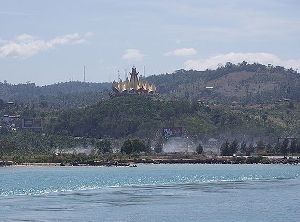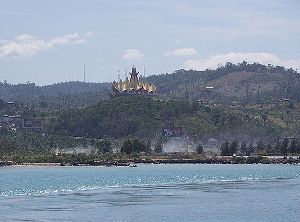 Indonesia’s government has set the country’s gross domestic product (GDP) growth for next year at 5.5% year-over-year as stated in the draft 2016 State Budget.
Indonesia’s government has set the country’s gross domestic product (GDP) growth for next year at 5.5% year-over-year as stated in the draft 2016 State Budget.
“Economic growth in 2016 is targeted to reach 5.5 percent,” President Joko Widodo said in his address while presenting August 14 the proposed State Budget for 2016 to the Plenary Session of the House of Representatives, according to state news agency Antara.
The draft is important as it shows government targets regarding the macroeconomy of the country and what fields public spending will be focused. The 2016 GDP growth target indicates government optimism that economic growth will finally rebound after four years of slowdown, according to an analysis by Indonesia Investments.
President Widodo said the global economic condition was projected to recover and lift global demand for Indonesian products.
Although the country is experiencing external troubles such as sluggish global economic growth and low commodity prices and internal problems like high inflation, high interest rates, and weak government spending, President Widodo seeks to offset the economic slowdown by enhancing public investment in infrastructure, improving the country’s exports, and implementing policies to boost people’s purchasing power.
The Indonesian government targets to spend IDR2,121.3 trillion (US$153 billion) in 2016, about 7% higher than targeted government expenditure this year. Roughly IDR313.5 trillion, or 2.5% of GDP, will be spent on much-needed infrastructure development. This figure is 8% higher than the allocated amount in the State Budget of 2015.
Next year’s targeted infrastructure development includes 376 kilometer of new roads, 110 kilometer of new railways, and 11 new airports.
“The infrastructure development is also expected to bolster the performance of the Gross Fixed Capital Formation and the national consumption,” President Widodo said, as quoted by Antara.
Jokowi said national connectivity improvement and expenditures reallocation to productive sectors are expected to stimulate the national economy, maintain the purchasing power of the people, and control inflation rate.
“Although it is good news that more money will go to infrastructure development it remains problematic to spend these funds as the country has been plagued by red tape, land acquisition problems, poor planning, and weak cooperation between government institutions on the central and regional level (and the lack of quality human resources at the local government level),” said Indonesia Investments.
It recommended that government focus more on combating matters that hamper infrastructure development spending. As an illustration, in the first seven months of 2015 the government was only able to spend 11% of total allocated funding for infrastructure development, it added.
The inflation target is set at 4.7% in the 2016 State Budget draft, slightly below this year’s target of 5%.
The government will support people’s purchasing power by allocating IDR201 trillion to diesel subsidies, electricity and gas subsidies, as well as subsidies for food, fertilizers and small business loans. By boosting production of rice, corn, soybeans, sugar and cattle, the government aims to improve food security in Southeast Asia’s largest economy and the world’s fourth most populous country.
As for Indonesia’s tax revenue, the government targets to raise IDR1,848 trillion through tax, fees and royalties, up 15 percent from the target in 2015. However, it will require structural reforms to improve tax collection (needed to finance the 2016 budget).
Indonesian Finance Minister Bambang Brodjonegoro said the government budget may hit 2.1% of GDP, slightly better than this year’s expected 2.2% of GDP and lessening the burden on the Indonesian government to borrow funds overseas or at home.
Photo: Sakurai Midori





